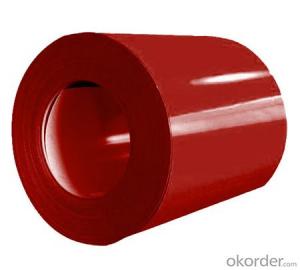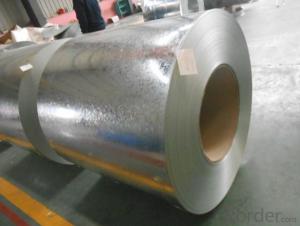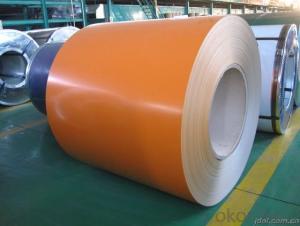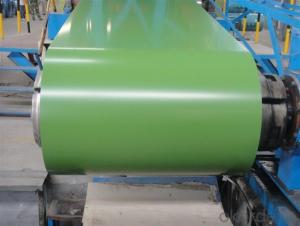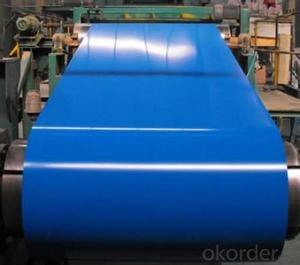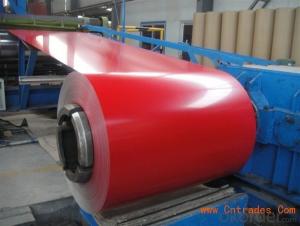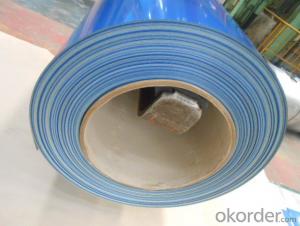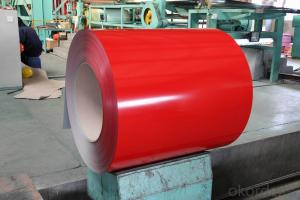Prepainted Galvanized Steel-CGC340--Excellent Process Capability
- Loading Port:
- China main port
- Payment Terms:
- TT OR LC
- Min Order Qty:
- 50 m.t.
- Supply Capability:
- 10000 m.t./month
OKorder Service Pledge
OKorder Financial Service
You Might Also Like
Prepainted Galvanized Steel-CGC340--Excellent Process Capability
Brief Introduction
Prepainted Galvanized Steel usually refers to have substrateprocessed with surface processed and coated then(roller coated )or bonded organic thin film and baked, and it is able to be processed tofinal prodevtion .
PrepaintedGalvanized Steel qualified with excellent decorative ,formability ,corrosionresistance ,coating adhesion ,can keep for a long time as well as maintainfresh color .For color coated steel sheet can obtain good economicbenefit by steel belt wood ,efficient in construction and save energy ,preventpollution etc.Which is an ideal material;for manufacturing board.
Specification:
Thickness: 0.15-0.8mm
Width: 600-1250mm
Length: on request
Zinc coating: 30-275g/m2
Color: RAL series
Paint: PE, PVDF, PU
Images
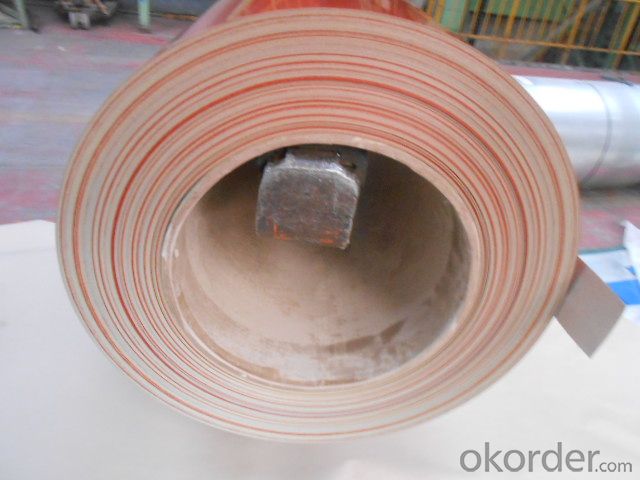
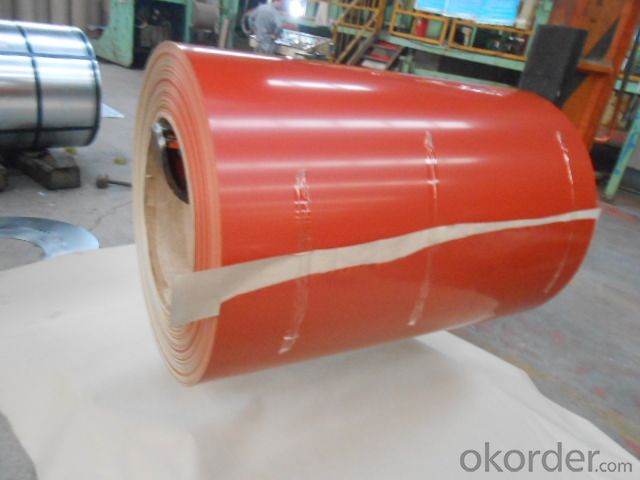
Application:
1.Buildings and constructions:roofing, ceilings, gutters, venting lines, indoor decorations,windowframes, etc
2.Electrical appliances:computer shells, washing machines, refrigerators, dehumidifiers,videorecorders, water heaters, etc.
3. Agriculturalequipments: troughs, feeding tools, agricultural driers, irrigation channels,etc.
4. Vehicle parts: back-seat plates of buses and trucks, conveying systems, oil tanks, etc.
Advantages:
1. High strength
2. Well rainproof performance
3. Good corrosion
4. Easy to install and remove
5. FAQ
1.How to guarantee the quality of the products?
We have established the international advanced quality management system,every link from raw material to final product we have strict quality test;We resolutely put an end to unqualified products flowing into the market. At the same time, we will provide necessary follow-up service assurance.
2. How long can we receive the product after purchase?
Usually within thirty working days after receiving buyer’s advance payment or LC. We will arrange the factory manufacturing as soon as possible. The cargo readiness usually takes 15-25 days, but the shipment will depend on the vessel situation.
- Q: I want to know if it is possible to make regular steel stainless.From what I understand stainless consist of chromium about 10 percent I think.Any way I'm wondering if properties can be added in a process or can this only be possible during actual manufacturing of the steel.And I'm not talking about chrome like stainless steel that's not to shiny.
- Worth very little as far as I'm concerned. It has a very poor co efficient of heat, is hard to lubricate to keep the food from sticking and will develop a hot spot easily. My preference is a good quality cast iron, it is heavy but conducts heat well and spreads it evenly. Stainless with copper bottoms is marginal for boiling water but it does clean easily. There are several alloys on the market that are usable as cook ware. Aluminum is worse than stainless. Of the pure metals, copper is the best conductor of heat, cast iron is my choice, spun steel does work. Hope this helps. Never wash cast iron cookware with soap and water.
- Q: What are the advantages of using galvanized steel coils?
- Using galvanized steel coils in various applications offers a multitude of benefits. Firstly, their resistance to corrosion is highly impressive. Through the process of galvanization, a protective layer of zinc is applied to the steel, effectively guarding it against moisture, chemicals, and other elements that can lead to rust and corrosion. As a result, galvanized steel coils are an excellent choice for outdoor applications that are exposed to harsh weather conditions or corrosive substances. Secondly, galvanized steel coils boast exceptional durability and longevity. The zinc coating provides an additional protective layer, enhancing the steel's resistance to wear and tear. Consequently, galvanized steel coils have a longer lifespan compared to other steel types, reducing the frequency of replacements and saving costs in the long term. Moreover, galvanized steel coils exhibit remarkable strength and structural integrity. The zinc coating not only offers corrosion resistance but also augments the overall strength of the steel. This makes galvanized steel coils an ideal option for applications that demand a robust and dependable material, such as construction, automotive, and industrial manufacturing. Furthermore, working with galvanized steel coils is effortless and requires minimal maintenance. The zinc coating creates a smooth and uniform surface, facilitating tasks like painting, welding, and fabrication. Unlike other coatings or finishes, galvanized steel coils do not necessitate regular maintenance or additional protective measures, reducing the time and effort required to keep them in optimal condition. Lastly, galvanized steel coils are environmentally friendly. The zinc coating used in galvanization is recyclable, making it a sustainable choice for various industries. Additionally, the extended lifespan of galvanized steel coils diminishes the need for frequent replacements, thereby reducing waste and the overall environmental impact. In conclusion, the advantages of utilizing galvanized steel coils encompass corrosion resistance, durability, high strength, easy workability, low maintenance, and environmental sustainability. These benefits have solidified galvanized steel coils as a favored option in a wide range of applications, spanning from construction and manufacturing to automotive and infrastructure projects.
- Q: What are the typical coil width options?
- The typical coil width options vary depending on the industry and application, but common options range from 1 inch to 72 inches or more.
- Q: Who started or popularized the use of the steel guitar in country music? Early country songs contained no steel guitars but by 1950 the steel guitar had become a staple of country music.
- As I don't know for sure I have a couple of really good guesses. I would say either Jerry Byrd of Ernest Tubb's Texas Troubadours or Don Helms of Hank Williams' Drifting Cowboys. I can tell you for sure that Bud Isaacs was the first player to use a pedal steel guitar on a hit recording: Slowly by Webb Pierce in 1953.
- Q: Can steel coils be coated with epoxy?
- Yes, steel coils can be coated with epoxy. Epoxy coatings provide protection against corrosion and enhance the durability and lifespan of the steel coils.
- Q: which type of carbon steel does not have manganese
- None. Mn is a trace impurity in all steels, if you look carefully enough. If you want to find a steel where Mn is not intentionally added, start looking at the alloy composition specifications, there are hundreds of steels. Why are you worried about Mn? Mn is typically added to steels for a very good reason.
- Q: What are the common applications of galvanized steel coils?
- Galvanized steel coils are commonly used in a variety of applications such as construction, automotive manufacturing, and the production of household appliances. They are used for roofing, siding, and structural components in buildings due to their corrosion resistance and durability. In the automotive industry, galvanized steel coils are used for manufacturing car parts, such as body panels and frames, to enhance their strength and longevity. Additionally, they are utilized in the production of household appliances like refrigerators, washing machines, and air conditioning units, as the galvanized coating protects against rust and extends the lifespan of these products.
- Q: I want an EDC (Every Day Carry) Knife that:~folds~is non-serrated~has a pocket clip~has a blade length of about 4 in. long~is concealable~urban environment friendly~priced around $50What do you suggest? I am currently thinking on purchasing the Cold Steel 4 inch Zytel Ti-Lite.
- Based okorder /
- Q: I need help my new stainless steel cookware is sticking ? My first meal was nasty!
- One of two things can cause this. Either your pan bottoms are light weight, or you are cooking at too high a temperature.
- Q: What are the different methods of forming steel coils into sheets?
- There are several methods of forming steel coils into sheets, each with its own advantages and applications. 1. Hot rolling: This is the most common method used to form steel coils into sheets. In this process, the steel is heated above its recrystallization temperature and then passed through a series of rollers. The rollers apply pressure to the heated steel, reducing its thickness and elongating it into a sheet. Hot rolling produces sheets with a smooth surface finish and is suitable for a wide range of applications. 2. Cold rolling: This method involves passing the steel coil through rollers at room temperature. Unlike hot rolling, cold rolling does not require heating the steel. The cold rolling process results in sheets with a higher dimensional accuracy and a smoother surface finish. Cold-rolled sheets are often used in applications where precise dimensions and a polished appearance are required, such as automotive body panels and appliances. 3. Annealing and pickling: This method involves subjecting the steel coil to a heat treatment process called annealing, followed by pickling. Annealing involves heating the steel to a specific temperature and then slowly cooling it, which helps to relieve stress and improve the material's mechanical properties. Pickling is the process of removing impurities and scale from the steel surface. These steps are typically performed before hot or cold rolling to ensure a high-quality end product. 4. Galvanizing: Galvanizing is a process that involves coating steel sheets with a layer of zinc to provide corrosion resistance. The steel coil is first cleaned and then immersed in a bath of molten zinc. The zinc adheres to the surface of the steel, forming a protective layer that prevents rust and corrosion. Galvanized sheets are commonly used in construction, automotive manufacturing, and electrical appliances. 5. Electro-galvanizing: This method is similar to galvanizing, but instead of immersing the steel coil in a bath of molten zinc, an electric current is used to deposit zinc onto the surface of the steel. Electro-galvanizing offers similar corrosion resistance to traditional galvanizing but with a thinner coating. It is often used in applications where a thinner, more lightweight sheet is desired. In summary, the different methods of forming steel coils into sheets include hot rolling, cold rolling, annealing and pickling, galvanizing, and electro-galvanizing. Each method has its own advantages and is suitable for different applications based on the required surface finish, dimensional accuracy, and corrosion resistance.
Send your message to us
Prepainted Galvanized Steel-CGC340--Excellent Process Capability
- Loading Port:
- China main port
- Payment Terms:
- TT OR LC
- Min Order Qty:
- 50 m.t.
- Supply Capability:
- 10000 m.t./month
OKorder Service Pledge
OKorder Financial Service
Similar products
Hot products
Hot Searches
Related keywords
